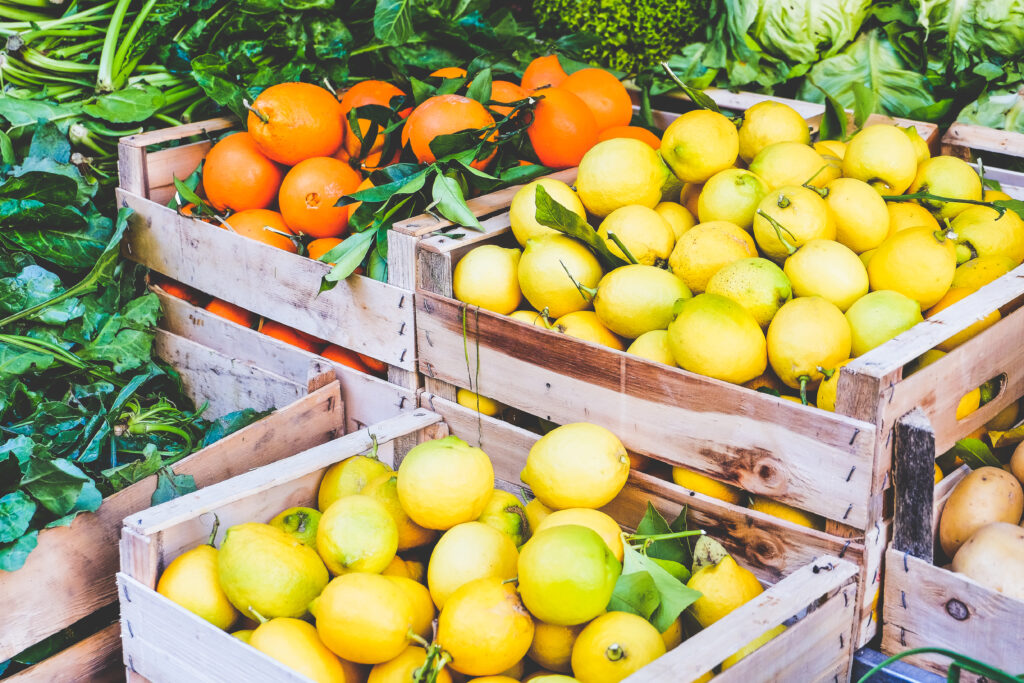August the 31st – IO1 Completion

Report on the state of the art of sustainability through food education in schools

Report on the state of the art of sustainability through food education in schools

FOOD WASTAGE
Download the presentation
FAO. Food lost and waste:
https://www.fao.org/platform-food-loss-waste/en/
UN & WFP. Key facts about food wastage:
https://www.wfpusa.org/articles/8-facts-to-know-about-food-waste-and-hunger/%23:~:text=Approximately%20%241%20trillion%20dollars’%20worth,away%20by%20retailers%20or%20consumers
EUFIC. Best before, use by and sell by dates explained:
https://www.eufic.org/en/archive/article/best-before-use-by-and-sell-by-dates-explained
FAO. Food wastage and the agenda 2030:
https://www.fao.org/policy-support/policy-themes/food-loss-food-waste/en/
EUFIC – Food production and food traceability:
https://europa.eu/youreurope/business/product-requirements/food-labelling/nutrition-declaration/index_en.htm%23:~:text=Under%20EU%20law%2C%20prepacked%20food,energy%20value
FOOD AND CULTURE
Download the presentation
Barilla Foundation (2021). Food is Culture:
https://www.fondazionebarilla.com/en/publications/food-is-culture/
UNESCO (2010). Traditional Mexican cuisine:
https://ich.unesco.org/en/RL/traditional-mexican-cuisine-ancestral-ongoing-community-culture-the-michoacn-paradigm-00400
FAO (2021). The art of cooking and what you can do to make it more sustainable:
https://www.fao.org/fao-stories/article/en/c/1412071/
Barilla Foundation (2021). Food that respects people’s and the Planet’s health:
https://www.fondazionebarilla.com/en/publications/peoples-health/
FOOD AND HEALTH
Download the presentation
WHO (2020). Healthy diet – Key facts:
https://www.who.int/news-room/fact-sheets/detail/healthy-diet
WHO (2021). Malnutrition – Key facts:
https://www.who.int/news-room/fact-sheets/detail/malnutrition%23:~:text=There%20are%204%20broad%20sub,deficiencies%20in%20vitamins%20and%20minerals
WHO (2021). Noncommunicable diseases – Key facts:
https://www.who.int/news-room/fact-sheets/detail/noncommunicable-diseases
The Mediterranean Diet:
https://mediterraneandietunesco.org/
Nutrition declaration:
https://europa.eu/youreurope/business/product-requirements/food-labelling/nutrition-declaration/index_en.htm%23:~:text=Under%20EU%20law%2C%20prepacked%20food,energy%20value
How to search for reliable source of information:
https://openoregon.pressbooks.pub/nutritionscience/chapter/2e-who-can-you-trust/%23:~:text=Trustworthy%20Sources,you%20know%20where%20to%20look
FOOD AND ENVIRONMENTAL SUSTAINABILITY
Download the presentation
Overshoot Day:
https://www.overshootday.org/
Farm to Fork strategy:
https://food.ec.europa.eu/horizontal-topics/farm-fork-strategy_en%23documents
Sustainable Plant-based diets:
https://planetbaseddiets.panda.org/
EUFIC – Food traceability:
https://www.eufic.org/en/food-production/category/food-traceability
SDGs, Food and Agriculture:
https://www.fao.org/sustainability/en/
FOOD AND SDGs
Download the presentation
Water, energy, food, and ecosystem nexus:
https://international-partnerships.ec.europa.eu/policies/climate-environment-and-energy/water-energy-food-and-ecosystem-nexus_en
FAO SDGs Wheel mode:
https://www.fao.org/publications/card/en/c/b31f7040-a387-466d-99e2-04896d421fca/
Example of different connections among food and SDGs:
https://www.un.org/en/food-systems-summit/sdgs
Plant-based diets:
https://planetbaseddiets.panda.org/
One health – a new approach to food:
https://www.fondazionebarilla.com/en/publications/one-health-a-new-approach-to-food/
PROJECT MANAGEMENT
Download the presentation
PRINCE2 METHOD:
https://www.youtube.com/watch?v=61RnrsWQE7A
Managing a project:
https://www.axelos.com/resource-hub/blog/using-prince2-to-manage-a-cake-business
Il Project Manager:
https://www.youtube.com/watch?v=05ZRite4UOI&t=7s
Project management tools:
https://trello.com/en
https://asana.com/
https://monday.com/
Project lifecycle:
https://www.youtube.com/watch?v=EBX8HRXIJ0w
Project lifecycle with PRINCE2:
https://www.youtube.com/watch?v=zZZP6Ni6YOw
Product Based Planning explained:
https://www.axelos.com/resource-hub/blog/achieving-the-endgame-product-based-planning-in-prince2
How to create a stakeholder map:
https://www.youtube.com/watch?v=eqZfiTp1HZw
Stakeholder map:
https://www.stakeholdermap.com/project-stakeholders.html
Stakeholder Engagement for School Leaders:
https://www.southbromsgrove.worcs.sch.uk/blog/?pid=2&nid=5&storyid=282
4 Project Pre-Planning & Stakeholder Analysis:
https://www.slideshare.net/Makewa/4-pre-planning-stakeholders-analysis-hu
INTERPERSONAL AND SOCIETAL COLLABORATION
Download the presentation
Empathy:
https://www.psychologytoday.com/intl/basics/empathy
How to Be More Empathetic – By Claire Cain Miller:
https://www.nytimes.com/guides/year-of-living-better/how-to-be-more-empathetic
Easy ways to practice empathy in your own life:
https://www.ted.com/talks/gwen_yi_wong_easy_ways_to_practice_empathy_in_your_own_life
Empowerment through Empathy in Nonformal Education:
https://www.empathy-learning.eu/wp-content/uploads/2020/02/Empathy-Companion.pdf
Importance of Empathy at school:
https://mcc.gse.harvard.edu/resources-for-educators/how-build-empathy-strengthen-school-community
Empathy in teachers’ professional development:
https://www.sciencedirect.com/science/article/pii/S187704281205481X
What is communication?
https://www.thoughtco.com/what-is-communication-1689877
Communication Skills:
Click here
The importance of communication skills at school:
https://www.sciencedirect.com/science/article/pii/S1877042815049587
The importance of communication and its process:
Click here
The power of verbal communication in learning:
https://www.atlantis-press.com/article/25890842.pdf
Teachers’ communication competencies:
Click here
The power of communication:
https://www.ted.com/talks/audrey_domond_the_power_of_communication
CREATING LEARNING SPACES
Download the presentation
The future of education and skills – Education 2030:
https://www.oecd.org/education/2030/E2030%20Position%20Paper%20(05.04.2018).pdf
Global Future Council on the New Agenda for Education and Skills:
https://www.weforum.org/communities/gfc-on-the-new-agenda-for-education-and-skills
Schools of the Future – Defining New Models of Education for the Fourth Industrial Revolution:
https://www3.weforum.org/docs/WEF_Schools_of_the_Future_Report_2019.pdf
Stanford d.school – case study:
https://www.youtube.com/watch?v=NSjezj7_6mc
How can we prepare students for the Fourth Industrial Revolution? 5 lessons from innovative schools around the world:
https://www.weforum.org/agenda/2020/02/schools-of-the-future-report-2020-education-changing-world/
These are the skills young people will need for the green jobs of the future:
https://www.weforum.org/agenda/2021/08/these-are-the-skills-young-people-will-need-for-the-green-jobs-of-the-future/
Want a job in 2025? These are the sectors to focus on:
https://www.weforum.org/agenda/2016/09/job-in-2025-skills-sectors-to-focus-on/
Empowering Students With Design Thinking:
https://www.youtube.com/watch?v=fuPWtw9ljk4
Design Thinking: A Problem Solving Framework:
https://www.youtube.com/watch?v=kfBa2AdjRB4
Improving School Experiences with Design Thinking:
https://www.youtube.com/watch?v=Y5tumfLc-Wo
Introduction to the d-school:
https://www.youtube.com/watch?v=LwT1zC4uUPA
What is Human-Centered Design?
https://vimeo.com/106505300?embedded=true&source=vimeo_logo&owner=8938528
STANFORD D.SCHOOL:
https://dschool.stanford.edu/
SYSTEM THINKING
Download the presentation
Symbiosis in Development – An integrated sustainable development framework for the modern era:
https://vimeo.com/216644087/86dc5091d2
Systems thinking – a cautionary tale (cats in Borneo):
https://www.youtube.com/watch?v=17BP9n6g1F0
What is a Complex System?
https://www.youtube.com/watch?v=vp8v2Udd_PM
Emergence & Systems Thinking:
https://www.youtube.com/watch?v=KN6SaRmF_8c
Why should you study System Dynamics?
https://www.youtube.com/watch?v=iveX64eYnbk
System thinking and ecology – Donella Meadown:
https://www.youtube.com/watch?v=HMmChiLZZHg
System thinking practices:
https://palms-lausd-ca.schoolloop.com/vidoesgallery
Role of systems in designing a new world:
https://www.youtube.com/watch?v=WrdSkqRypsg
Saltwater Brewery “Edible Six Pack Rings”:
https://www.youtube.com/watch?v=-YG9gUJMGyw
MOOC Systems Thinking and Environmental Sustainability | WUR:
https://www.youtube.com/watch?v=X7bDNSwm270
What’s the Link Between Systems Thinking & Design for a Circular Economy? | Ken Webster:
https://www.youtube.com/watch?v=gHK_brHezfI
Transdisciplinary Case Studies on Design for Food and Sustainability:
https://www.elsevier.com/books/transdisciplinary-case-studies-on-design-for-food-and-sustainability/massari/978-0-12-817821-8
2030 AGENDA AND THE SUSTAINABLE DEVELOPMENT GOALS
Download the presentation
Declaration of the United Nations Conference on the Human Environment (Stockholm Declaration, 1972):
https://docenti.unimc.it/elisa.scotti/teaching/2020/22646/files/stockholm-declaration
Brundtland Report, 1987:
https://sustainabledevelopment.un.org/content/documents/5987our-common-future.pdf
Rio Declaration on Environment and Development, 1992:
https://www.un.org/en/development/desa/population/migration/generalassembly/docs/globalcompact/A_CONF.151_26_Vol.I_Declaration.pdf
Millennium Development Goals, (2015):
https://www.un.org/millenniumgoals/2015_MDG_Report/pdf/MDG%202015%20rev%20(July%201).pdf
Declaration on the right to development, 1986:
https://www.ohchr.org/en/instruments-mechanisms/instruments/declaration-right-development
Fagan M. – Huang C., (2019). A look at how people around the world view climate change:
https://www.pewresearch.org/fact-tank/2019/04/18/a-look-at-how-people-around-the-world-view-climate-change/
Ecological footprint calculator:
https://www.footprintcalculator.org/
Nations United: Urgent Solutions for Urgent Times | Presented by Thandie Newton:
https://www.youtube.com/watch?v=xVWHuJOmaEk&t=23
Palmer. E., (2015). Introduction: The 2030 Agenda, Journal of Global Ethics:
https://doi.org/10.1080/17449626.2015.1119928
Arts K., (2017). Inclusive sustainable development: a human rights perspective, Current Opinion in Environmental Sustainability:
https://doi.org/10.1016/j.cosust.2017.02.001
Emma Watson presents Agenda 2030:
https://www.youtube.com/watch?v=Qx0AVjtdq_Q
General Assembly, (2015). Transforming our world: the 2030 Agenda for Sustainable Development, A/RES/70/1:
https://documentsddsny.un.org/doc/UNDOC/GEN/N15/291/89/PDF/N1529189.pdf?OpenElement
United Nations, Department of Economic and Social Affairs Sustainable Development:
https://sdgs.un.org/goals
DIGITAL COMPETENCES FOR EDUCATION
Download the presentation
General framework and video (source: EU science hub)
https://joint-research-centre.ec.europa.eu/digcompedu_en
Usage of media and compliance to EU regulations (source: European Parliament):
https://www.europarl.europa.eu/factsheets/en/sheet/138/audiovisualand-media-policy
Courses in the EU “teachers Academy” (source: School Education Gateway EU):
https://www.schooleducationgateway.eu/en/pub/teacher_academy.htm
“Digital transformation in education: challenges and opportunities” (source: University of Sidney):
https://youtu.be/GF9gVa8tUI8
Web search basic and advanced techniques (source: Suny Empire College, NY):
https://subjectguides.esc.edu/researchskillstutorial/boolean
Modern fact-checking techniques (source Washington post):
https://www.youtube.com/watch?v=RVrANMAO7Sc
EEB collabora con le autorità pubbliche locali e nazionali e con l’Università di Plovdiv, per l’organizzazione di attività congiunte nel campo della formazione professionale, del turismo educativo, dell’internazionalizzazione e dell’innovazione nell’ambito delle attività produttive.
Durante i cinque anni di corso di studio gli alunni hanno la possibilità di seguire, diverse attività di laboratorio o di perfezionamento delle proprie capacità professionali. Per queste attività hanno a disposizione l’azienda agricola e l’industria (Food Farm 4.0) con un moderno impianto tecnologico di trasformazione alimentare e alcuni laboratori scolastici attrezzati tra cui una nuova cantina.